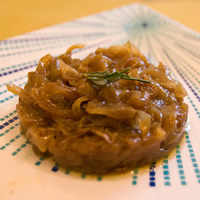health guides
Caramelized Onions

Ingredients
- 4 medium yellow onions
- 3 Tbs extra virgin olive oil
- 1/4 cup dry white wine
Directions
- First things first: peel your onions. Chop off the top and bottom of the onion, then sit it on your cutting board and slice it in half. Cut both sections length wise again. Continue to cut the onion until you have slivers of about ¼ of an inch wide. Do not cut the onion across. You want to end up with about 8 wedges of onion. Pull each wedge apart to separate the natural layers. Do this to all of your onions and set aside.
- Add the olive oil to a cast iron frying pan.
- Heat the oil on medium high until it starts to shimmer. Add the onions and toss them in the oil so they are all equally coated. Don’t worry if the pan seems overly full, onions reduce in size as they cook. Fry them for about 1 minute and reduce the heat to low.
- Set a timer for 10 minutes and walk away. I know it’s hard, but resist the urge to stir them! When the buzzer goes off, turn the onions and set the timer for another 10 minutes. Continue to do this until the onions are caramelized. This usually takes between 2 to 4 hours.
- Remove the onions from the pan and drain the oil into a reusable jar. Add the white wine to the frying pan and de-glaze it, making sure to scrape up all the remaining brown bits. Combine with the onions.
- Store the onions in a sealed container in the fridge.
Nutrition Facts
Copyright © 2024 TraceGains, Inc. All rights reserved.
Read our healthy recipe definitions.
Learn more about TraceGains, the company.
The information presented here is for informational purposes only and was created by a team of US–registered dietitians and food experts. Consult your doctor, practitioner, and/or pharmacist for any health problem and before using any supplements, making dietary changes, or before making any changes in prescribed medications. Information expires December 2024.


 We are proud to announce that
We are proud to announce that  As the market evolves, customers increasingly request a wider variety of omega-3 options for their lipid...
As the market evolves, customers increasingly request a wider variety of omega-3 options for their lipid...  Maintaining healthy glucose levels is crucial for preventing metabolic conditions like diabetes,...
Maintaining healthy glucose levels is crucial for preventing metabolic conditions like diabetes,...  Looking at formulating a new vitamin blend? Discover
Looking at formulating a new vitamin blend? Discover 







































